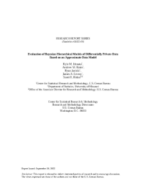Evaluation of Bayesian Hierarchical Models of Differentially Private Data Based on an Approximate Data Model
Evaluation of Bayesian Hierarchical Models of Differentially Private Data Based on an Approximate Data Model
Abstract
Official statistical agencies have an obligation to protect the confidentiality of their respondents. Traditionally, the task of disclosure avoidance has consisted of a variety of different approaches, including cell suppression and data swapping, among others. More recently, official statistical agencies (e.g., the U.S. Census Bureau) have employed differential privacy (DP) methods to facilitate DA. A major component of this method of DA involves the addition of noise to the observed measurements from an appropriate DP noise distribution based on a pre-specified privacy-loss budget. Consequently, it may be desirable to develop statistical models for the DP noisy measurements which can be used to produce more accurate synthetic data releases. One natural way to achieve this is using a Bayesian hierarchical model with an approximation to the DP noise distribution at the data level of the model hierarchy. Through model-based and empirical simulations, this paper evaluates the accuracy of this modeling approach under various settings of the DP noise distribution, the privacy-loss budget, and different approximations. We show that the Gaussian distribution provides a suitable, and computationally tractable approximation to Laplace and Discrete Gaussian noise mechanisms when the magnitude of the noise mechanisms is not too large.




